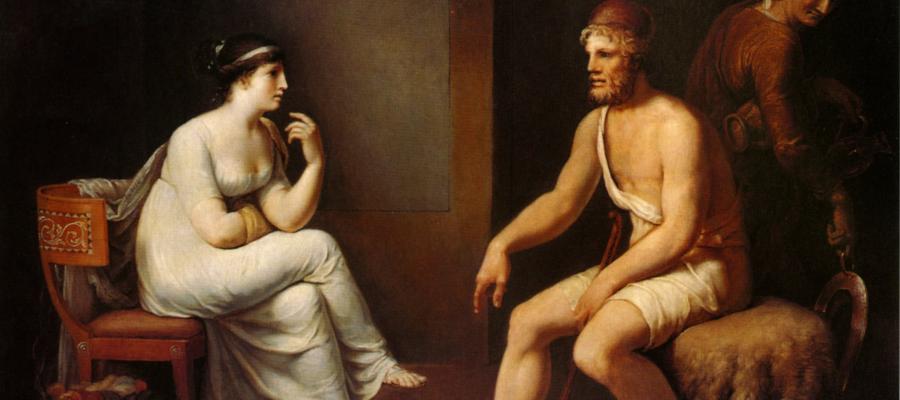Why Poetry Matters
Apr 10, 2022Some people say they find poetry impenetrable. Yet readership is increasing: in a 2017 survey, the National Endowment for the Arts foun...

One good thing happened in 2020: the Nobel Prize in Literature was awarded to Louise Glück. This was a wonderful decision, and I for one could not be happier about it. It’s also a source of joy for the Stanford community generally, since we’ve been lucky enough to have Glück teaching here for a quarter over the last several years.
The Nobel committee got it absolutely right, in that Glück is one of the great poets of our age; her magnificent poems are mysterious, powerful, and haunting. They have a way of staying with you for days—if not for life. That has certainly been the case for me with my all-time favorite Glück poem, “Ithaca”:
The beloved doesn’t
need to live. The beloved
lives in the head. The loom
is for the suitors, strung up
like a harp with white shroud-thread.
He was two people.
He was the body and the voice, the easy
magnetism of a living man, and then
the unfolding dream or image
shaped by the woman working the loom,
sitting there in a hall filled
with literal-minded men.
As you pity
the deceived sea that tried
to take him away forever
and took only the first,
the actual husband, you must
pity these men: they don’t know
what they’re looking at;
they don’t know that when one loves this way
the shroud becomes a wedding dress.
The background story, of course, is drawn from the Odyssey. Penelope, Queen of Ithaca, is awaiting the return of her husband Odysseus, who’s been at war and at sea for two decades. Since most people assume he is dead, a bunch of suitors hang around in the palace, waiting for Penelope to choose one of them as her new royal husband; she says she’ll choose when she’s finished weaving a shroud for Laertes, father of Odysseus, but she secretly unweaves part of it every night. In Homer it’s a tale of steadfast fidelity and of ingenuity (Penelope is very much the equal of her famously wily husband). In Glück it’s also a meditation on love—and on poetry.
Here the shroud is not so much for Laertes as for Odysseus, the husband presumed dead. “The shroud becomes a wedding dress”: Penelope is married to a ghost, a shadow. She’s married to the image of Odysseus, not to the man himself. So: is that a good thing or a bad thing?
Well, if “the beloved lives in the head,” then even if he’s away for twenty years, in another sense he’s still with you. That's uplifting… right?
Not necessarily: it also means you’re in love with someone who doesn’t exist. A dead man. You’re married to a corpse. (Just listen to that beautiful hidden rhyme that seals the connection: "lives in the head" / "with white shroud-thread.”)
At a reading of her poetry, Glück had this to say about her writing: “My thinking is characterized by oppositions—I argue with myself, like a courtroom drama.” In “Ithaca” perhaps Glück is arguing with herself about love. Is love better when it attaches to a real person (in which case we suffer when they’re away from us) or when it attaches to our vision of them (in which case we may just be deluded)?
And Glück is also arguing with herself about poetry. The loom is like a harp; the absent man is not just a corpse but an “image.” What’s dangerous, then, is not just imagination but image-making. If you replace real people and things with images—pictures, songs, metaphors, poems—you’re making them evaporate. Turning them into ghosts.
So is image-making bad? The final line seems to suggest as much: “the shroud becomes a wedding dress.” Pretty soon you’re married to something dead, trapped in a world that doesn’t exist, yoked together with no way out.
But wait... that itself is a metaphor! And a great one. A Nobel-Prize-worthy one!
So maybe images are good after all; maybe the "literal-minded men,” who "don’t know what they’re looking at,” are the fools. The ability to understand metaphor—to see beyond surfaces, to see things for what they also stand for—is what lifts smart, wily, thoughtful, creative Penelope above these dullard men. Those pictures in your mind are life-enhancing, not life-destroying.
We’re invited to stand in judgment over those dumb, literal-minded suitors, and maybe even to wish them harm. (Lured by that brilliant line-break in the first stanza, did you think for a moment that “strung up” referred to them? Did you hope it?) But somehow we’re also asked to pity them, as the poem suddenly becomes about us, the reader (where did this “you” come from?): “As you pity / the deceived sea... you must / pity these men.”
Which is better, then: a totally accurate picture of the beloved, or a picture in your head? Literal-mindedness, or poetry? Once it gets in your head, Glück’s poem will never stop gnawing at you. In the best possible way, her lyric becomes a wedding dress.
Comments (1)
Tim Smith
Friday, December 25, 2020 -- 11:44 AM
This is philosopher's poem,This is a philosopher's poem, to love this way, to think about, be merry and married to the thought.
Thanks for writing this Josh. Happy Holiday.